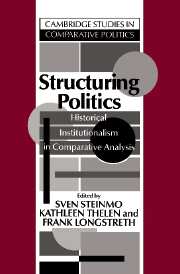Book contents
- Frontmatter
- Contents
- Preface
- List of contributors
- 1 Historical institutionalism in comparative politics
- 2 Labor-market institutions and working-class strength
- 3 The rules of the game: The logic of health policy-making in France, Switzerland, and Sweden
- 4 The movement from Keynesianism to monetarism: Institutional analysis and British economic policy in the 1970s
- 5 Political structure, state policy, and industrial change: Early railroad policy in the United States and Prussia
- 6 Institutions and political change: Working-class formation in England and the United States, 1820–1896
- 7 Ideas and the politics of bounded innovation
- 8 The establishment of work–welfare programs in the United States and Britain: Politics, ideas, and institutions
- Index
Preface
Published online by Cambridge University Press: 04 August 2010
- Frontmatter
- Contents
- Preface
- List of contributors
- 1 Historical institutionalism in comparative politics
- 2 Labor-market institutions and working-class strength
- 3 The rules of the game: The logic of health policy-making in France, Switzerland, and Sweden
- 4 The movement from Keynesianism to monetarism: Institutional analysis and British economic policy in the 1970s
- 5 Political structure, state policy, and industrial change: Early railroad policy in the United States and Prussia
- 6 Institutions and political change: Working-class formation in England and the United States, 1820–1896
- 7 Ideas and the politics of bounded innovation
- 8 The establishment of work–welfare programs in the United States and Britain: Politics, ideas, and institutions
- Index
Summary
This book grew out of a workshop held in Boulder, Colorado, in January 1990. The workshop brought together a group of scholars working on a diverse range of empirical issues, but whose work in each case was informed by a “historical institutional” approach. The purpose of the workshop was to highlight common analytic themes within historical institutionalism, to assess the contribution of this approach to comparative politics, and to identify research agendas for the future that can refine and develop it further. Our goal was to initiate a conversation among institutionalists working in different empirical fields on fundamental questions of how institutions develop and influence political outcomes. Thus, unlike similar enterprises of the past, this book is not organized around a common empirical focus. By bringing together writings that apply institutional analysis to a variety of national contexts and policies we want to highlight the methodological and theoretical foundations of this approach and to focus attention on the general contributions it can make to comparative politics.
The book makes no pretense to encompass all strains of thought within what is more broadly referred to as the “new institutionalism.” For many, new institutionalism is associated with historical sociologists such as Theda Skocpol and political scientists with predominantly “qualitative” methodologies such as Peter Katzenstein and Peter Hall. But new institutionalism comes in a rational choice variant as well (see, e.g., Popkin, Bates, North, Levi, and Lange). The introductory chapter addresses some areas of overlap and differences between rational choice institutionalism and historical institutionalism, but the primary emphasis throughout the book is on historical institutionalism.
- Type
- Chapter
- Information
- Structuring PoliticsHistorical Institutionalism in Comparative Analysis, pp. ix - xPublisher: Cambridge University PressPrint publication year: 1992

